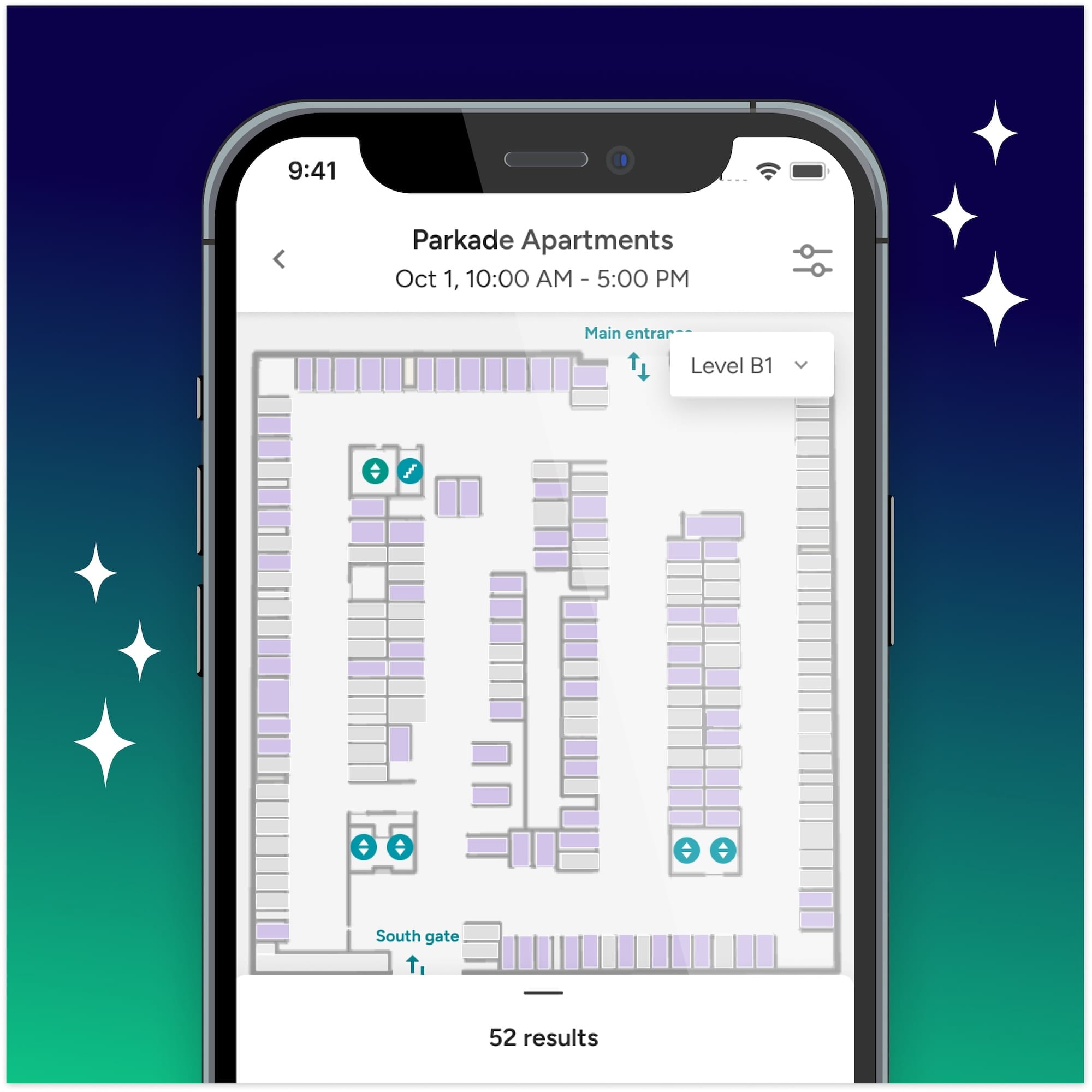

TABLE OF CONTENTS
There’s no shortage of speculation about what 2024 is going to deliver. Some are confident that it’s going to mark a positive upturn after the instability in 2023. Others are equally as confident that it will go in the exact opposite direction. There’s truly no way to predict what the next year has in store.
However, we can confidently say that one thing that you should plan for is evaluating and optimizing your parking operations.
If you’re a property manager, developer, or anyone else involved in the multifamily property space, this year marks a critical point in time to streamline your parking management if you want to keep up with resident expectations and meet occupancy goals.
Not buying it? Here’s the proof.
While rent was on a steady rise in a freshly post-COVID world in 2021 and 2022, the increases are beginning to level off. Rent growth hit a peak of about 14% in 2021, and 8% in 2022. In 2023, however, growth sank to around 2% and is expected to continue to decline in 2024.

These past few years, properties have been able to rely on these significant rent increases to stave off the effects of inflation. But now, you likely can’t raise prices without risking losing residents to your competitors. That means you have to be more creative about the additional revenue streams you create.
While this “other income,” i.e. revenue that comes from anything other than rent, is usually a an underutilized category, this may evolve as we head through 2024.
Parking is one of the most obvious opportunities to bring in extra revenue according to Forbes. Often, you have large, expensive lots on your property, so you might as well tap into it and rethink your pricing strategy or even consider new ways to monetize unused spots.
Property crimes were on the decline until 2022, but are now on the rise again. This fact, paired with the fact that the National Crime Prevention Council found that apartments are 85% more likely to be burglarized than single family homes, points to a need for increased investment in security for your properties. Renters are increasingly putting security measures at the top of their list of priorities when searching for a new place to live.
Secure parking is one of the most effective ways to give your residents extra peace of mind.
Something as simple as a parking gate can be a major crime deterrent, with burglars themselves saying that it’s one of the main factors that stops them from hitting a certain property.
But even for non-gated properties, organized and up-to-date parking records can help you keep your property more secure. This visibility into real-time parking activity helps you to easily identify who should – and shouldn’t – be in your lot at all times. Without a reliable system, the uncertainty increases the risk of bad-intentioned trespassers going undetected.
Increasingly, properties are looking to reduce their on-site teams and shift some of the day-to-day responsibilities to centralized teams at HQ, or even technology. Many teams are hoping to reduce – or have already reduced – their on-site headcount by around 40%.
One example of this is at Camden Property Trust. By consolidating teams, they were able to reduce 170 assistant managers down to 30 centralized team members. Many companies don’t experience as dramatic of a reduction as this, but team sizes are trending downward in the industry overall.
Consider what impact this has on your parking operations.
With less on-site team members, that means fewer people available at any moment to field resident issues, to manage guest parking, and to enforce your parking rules. Operating as the status quo will cause problems for both you and your residents. This shift towards centralization also requires a shift to a more streamlined, technology-based parking management process.
When interest rates were hovering at the lowest they’ve been in years, home ownership in the United States spiked. But now, with interest rates steadily rising again, the percentage of homeowners is sinking, dropping from a peak of almost 70% in 2019 to around 65% in 2022. Many Americans are getting priced out of the housing market, with these increases in interest often raising the lifetime cost of a $300,000 home by around $200,000.
For properties, this is good news! You’ll have a bigger pool of residents to draw in. But that also means that if you are struggling to manage your parking with vacant units, you’re going to have a tough time keeping up at full capacity.
With the decrease in homeowners comes more families renting, as well. Families are more likely to have multiple cars per unit than single renters or couples. This could lead to an increase in your spaces needed per unit.
To reap the full benefits of more filled units, you’ll need to be proactive about planning and managing your parking efficiently to greet them in the most positive way and avoid any parking lot drama with existing residents.
There are more apartments in the United States than in decades prior. Apartment supply jumped to a 36-year high in 2023 as a result of all of the new construction. Almost 450,000 apartment units were built last year, and this trend is expected not only to continue but to increase in 2024.
With more supply comes more competition. Although there are more renters now than before, you’ll be throwing your hat in the ring with countless other places they could live. So you’ve got to find some way to stand out.
You know the drill when a shiny new apartment opens up near you. You throw on an extra coat of paint, fix any glaringly broken things, and start thinking about what amenities you may want to touch up or add.
While many people love a good pool, sauna, or tennis court, many of the amenities that renters want the most are not these fancy, fun features. Reports show that the most in-demand amenities are those that enhance the convenience, comfort and security in renters’ everyday lives.
At the top of this list are: package delivery systems, smart access control systems, smart locks, smart thermostats and reliable parking.
Let’s zoom in on the parking point. Parking is often one of the biggest pain points that renters have to deal with, especially in busy or downtown areas. If you can offer seamless parking for both your residents and their guests, you can leverage that as a major point of differentiation between you and apartment complexes nearby.
The real estate industry is beginning to catch up in the multi-industry trend of digitization. More and more properties now leverage technology to boost efficiency, save time, and find their competitive edge. A failure to keep up could lead to barriers to getting in front of your competition.
The numbers don’t lie. In 2023, the global proptech market size reached about $35 million and is expected to reach $40.5 billion in 2024. At its peak, it’s expected to shoot up to $133 billion in 2032. This massive growth in the industry pointed to an industry wide embrace of things like AI leasing tools, digital maintenance requests, and pricing automation.
Parking technology specifically is experiencing a surge in demand, with an expectation of a 23.2% growth from 2020 to 2027. Historically a pain point in multifamily properties, people are looking to solutions like smart parking systems to streamline and optimize their processes.
Tools like Parkade help you bring your parking strategies into the modern age by digitizing all aspects of parking management, including assignments, enforcement, and payments.
As you’re planning your initiatives for 2024, make sure you slot in time to optimize your parking. Although there is much uncertainty around what this year has in store, we can be sure that being as intentional and efficient as possible is going to give your property the edge you need to end up on top once December rolls around.
Know that you need to fix parking but have no idea where to start? Take a look at some of the biggest problems Parkade can solve and see how many resonate with you.
.jpg)
As parking management becomes increasingly digital, security becomes critical — and we’re excited to share that we've achieved a major security milestone.
Read Story
We’re thrilled to announce one of our most significant leaps forward this year: the launch of dynamic maps across our mobile and web applications.
Read Story
Now that AB 1317 is official, it’s time to brush up on the requirements and see how your properties stand to benefit.
Read Story